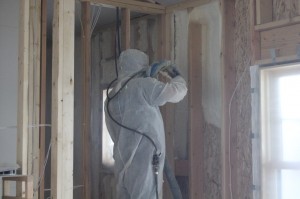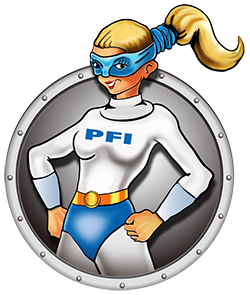Advantages of Spray Foam Insulation
Controls Air Infiltration

Spray Foam Insulation
Spray Polyurethane Foams have been used as a high-performance insulation material for more than 30 years. People call it air infiltration but, technically, it is unwanted, uncontrolled air-flow through the house, moving in or out of the structure. For example, in cold weather, the heated air inside the house flows out. Frigid outside air and moisture leak in rooms feel drafty. This uncontrolled air disrupts the temperature, air pressure and humidity of the living space, in any weather. The heating and cooling system has to work harder to maintain your family's comfort. Energy is wasted and that causes higher utility bills.
Reduces/Eliminates Convection Currents Within The Walls
Intrusion of air into the stud wall cavity causes convection (movement of warm air to the top of the cavity and cold to the bottom). After the insulation is installed, there should not be any air circulation from one side of the stud space to the other. Any cracks or breaks in the system will reduce the effectiveness of the insulation. Unlike other insulation types, such as fiber, which permit air movement, closed-cell polyurethane spray foam brand SPF stops air infiltration and reduces convection.
Minimizes Infestation
Closed-cell polyurethane spray foam has no nutritional value that would attract insects or other pests.
Minimizes Thermal Bridging
Different components of building construction have differing thermal resistances factors. This can produce cold areas that lead to condensation inside the walls. Closed-cell polyurethane spray foam covers the bridges on all sides, greatly reducing the transmission of heat or cold. Fully-adhered closed-cell polyurethane spray foam replaces the need for adhesives or numerous mechanical fasteners that penetrate the substrate and decrease insulation efficiency.
Controls Condensation
Many homes now are built tighter and with greater insulation than ever before. However, this can mean that moisture from cooking, laundry and showers can be trapped in attics and other places where it can lead to wood rot, peeling paint, and deteriorating roofing and ceiling materials. In turn, that can affect the insulation value of commonly used home insulation materials. Used to insulate, closed-cell polyurethane spray foam insulation systems control both heat build-up and condensation, resulting in a cooler attic in warmer environments and a dryer attic in cold climates. For the homeowner, that means comfort, energy conservation and structural stability.
Keeps Water Out Of The Home
The closed-cell hydrophobic nature of polyurethane spray foam provides extra insurance that your exterior walls will shed water by sealing walls from the inside, where leaking areas may not easily be seen.

